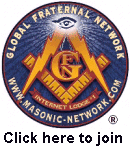
The GFN Treasure Chest Archives
www.masonic-network.com
"Where Master Masons Communicate"

 |
The GFN Treasure Chest Archiveswww.masonic-network.com |
 |
The above quotation sets down the Code of Law or Boundary of Masonic Law as defined by the Grand Lodge . As with all of Freemasonry this short sentence sets the standard by which we, as Brother Masons, are to use in guiding our actions with mankind and more especially with our fellow Brother Masons. However, this gives us a specific guideline concerning our service to our respective lodge. In Freemasonry, many things are open to individual interpretation and with that in mind, I will attempt, to elaborate on this subject a little further.
In Anderson's Constitutions of 1723, Section 3 (III of LODGES) It states: "A Lodge is a place where Masons assemble and work; Hence that Assembly, or duly organized Society of Masons, is call'd a Lodge, and every Brother ought to belong to one, and to be subject to its By-Laws and the General Regulations. It is either particular or general, and will be best understood by attending it, and by the Regulations of the General or Grand Lodge hereunto annex'd. In ancient Times, no Master or Fellow could be absent from it especially when warned to appear at it, without incurring a severe Censure, until it appear'd to the Master and Wardens that pure necessity hinder'd him. The persons admitted members of a Lodge must be good and true men, free-born, and of mature and discreet age, no bondmen no women, no immoral or scandalous men, but of good Report." So even 6 years after the first public formation of a Grand Lodge, Brothers were formulating boundaries by which we should govern ourselves concerning our lodge. We also find in the Landmarks of Freemasonry as defined by Brother Albert G. Mackey in 1858 [later compiled into "A Textbook of Masonic Jurisprudence]: Landmark 9: That it is the necessity of Masons to congregate in Lodges. Now let's get into how our Masonic Code of Law fits in with these - to circumscribe our behavior within our Lodge.
The Random House Unabridged Dictionary, © Random House, Inc. 2006, defines duty as: An action or task that one is expected to do by moral or legal obligation. The American Heritage Dictionary further defines contribute as: to act to bring together or be a factor in. So this landmark can be said to be communicating to us, that it is the moral task or obligation of all Masons, to be a factor in the operations of his respective lodge. Now what exactly are the operations of a Lodge?
Well, given the Nature of Freemasonry as an Institution of Instruction, some sort of Education must take place. As with any organization, Finances must be considered in order to pay bills. Time must be given to the organization. A healthy morale or harmony must be inherent within the organization or [it] will collapse on itself with chaos and divisiveness. So these are the 4 main ways we can contribute to our lodge.
We contribute with Education by listening to and dispensing Masonic Education to and [from] our fellow Brethren in our Lodge. The Lodge's Finances are met when we pay our dues or contribute to the Festive Board or any other fund that our Lodge has established for the financial operations task[s]. Our time in practicing degrees, attending Stated Communications and Special Communications or Lodges of Instruction contribute to our time spent with our Lodge.
The last way, that of contributing to a healthy morale or harmony can be said to be the most important of all. Without this contribution, on our part, the lodge will be seen as a chore or a task to be put off until the last minute or avoided at all cost and all the other ways to contribute will in turn suffer or cease altogether. I find it enlightening that contributing is used as an adjective to describe the exact type of member we should strive to be. It sets out a clear duty to be serviceable to our lodge.
So we must remember the Code of our Masonic Laws and strive to be a positive factor in the operations of our lodge. It is our duty as true and loyal Brother Masons united by a common theme and traveling upon the level time in search of "light" from the Grand Architect of the Universe.
"The whole Masonic system of symbolism centers on the truths of God and the immortality of the soul." Brother Silas Shepherd
"A Lodge is a place where Masons assemble and work: Hence that assembly, or duly organized society of Masons is called a Lodge, and every Brother ought to belong to one, and be subject to its by-laws and the general regulations."
Brother Silas Shepherd
From the Great Light of Masonry: "I remember your ancient laws O'Lord, and I find comfort in them. Indignation grips me because of the wicked, who have forsaken your law. Your decrees are the theme of my song wherever I Lodge." Psalm 119:52-54